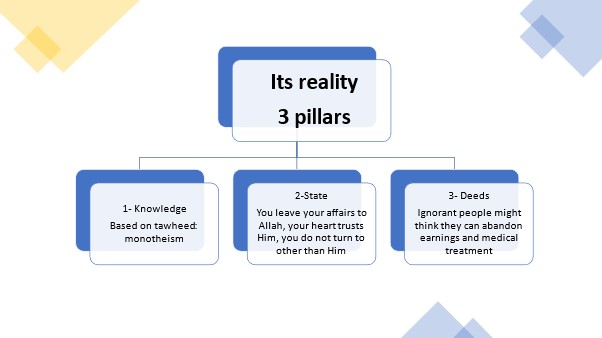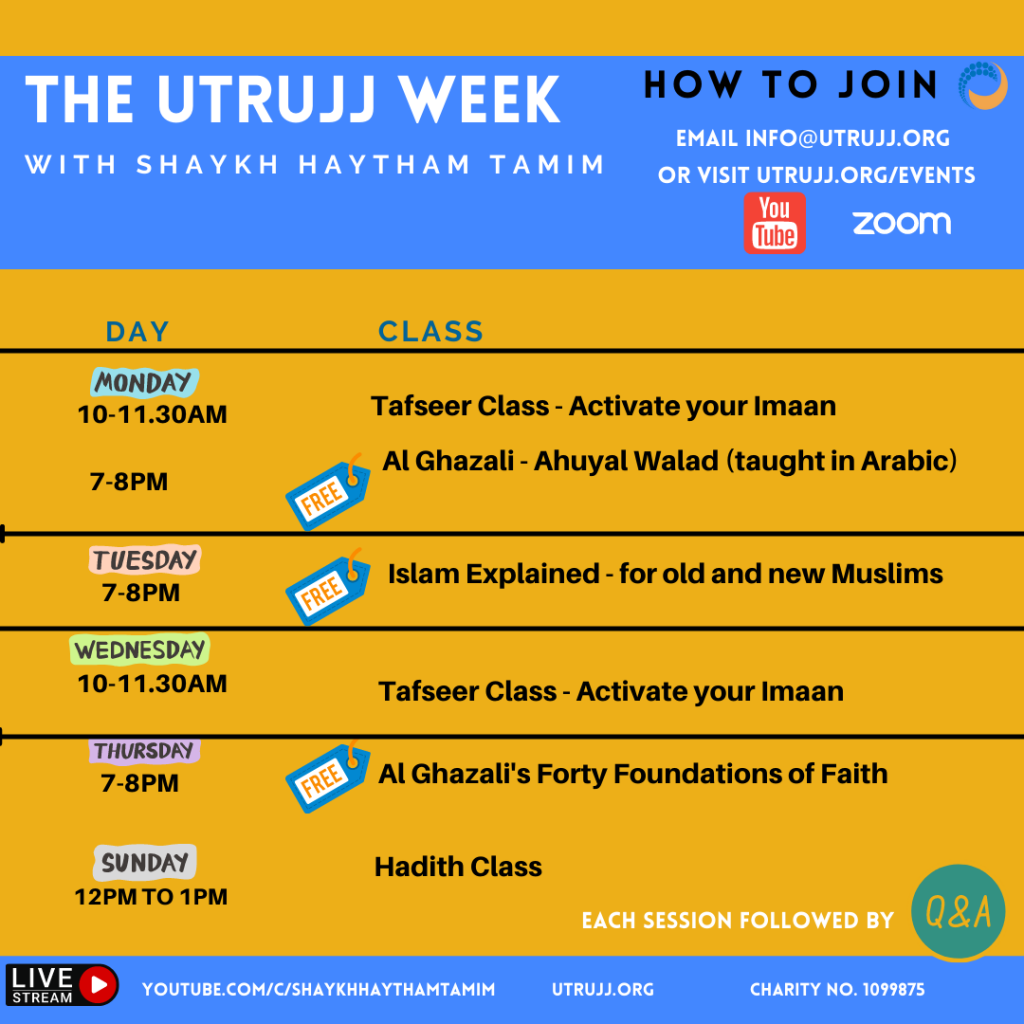Ghazali on Reliance (part 2)


Ghazali looks at tawakkul, breaking it into divisions and levels of tawakkul. The essence of tawakkul is putting your trust in Allah which comes from 3 things:

The 3 pillars of tawakkul

- ILM – Knowledge – of monotheism. Knowing that Allah is the Creator, Protector and Sustainer
- HAAL- State – leave your affairs to Allah, your heart trusts Him, you do not turn to other than Him in your heart.
- AMAL – Deeds – ignorant people might think tawakkul is abandon earning (kesb) and efforts (sai), or medical treatment (tadawi).
There are misconceptions about tawakkul because knowledge is lacking. In fact, you need more than knowledge, as you need a state of heart and then action. We often jump into actions without the right knowledge or state of heart. You shouldn’t do this, because your action has to be based on knowledge. The fruit of this knowledge goes to the heart and from there is translated into action. We do not wait for our rizq (provision) to parachute on us, we have to go out and seek it. Tawaakul (with the extra alif) is laziness.
Tawakkul is not tawaakul/laziness – it is tying your camel and then relying on Allah.
True tawakkul does not contradict common sense and is in line with the general guidance of the shariah.
- Level 1
To have confidence in someone once you are convinced of their perfect guidance, ability and sympathy. You feel comfortable in their hands. This is just at a human level, imagine comparing this to Allah’s competence, which is well beyond human level. Therefore once you have done your bit, relax because you can trust Allah the most.
- Level 2
This is stronger than the state of a little child’s confidence in their mother. You are utterly dependant on her love and compassion. You have a deeper bond than with a person whose expertise you trust.
- Level 3
The highest level a person can be in Allah’s Hand is like a corpse in the hands of the one who is washing it. You have no choice. You leave the decision to Him. This is like the station of Ibrahim despite the narrations not being authentic, but Sufi books quote frequently that when Nimrod threw Ibrahim (peace be upon him) into the fire for destroying their idols, Jibril came to him and asked him what he wanted, and he replied that Allah knew what he wanted, so he did not need to reply. This is a fabrication.
The third pillar is about ‘doing tawakkul’ the right way. The right way is not to follow ignorant people’s actions or beliefs. They might think tawakkul is getting Allah to do everything for you, without lifting a finger.
The Prophet (peace be upon him) was the master of the mutawakileen. He did not abandon medical treatment, but commanded believers to seek medical treatment. Yet at the same time, he knew it was not the medicine which cured, but Allah.
Allah has connected the cause with the action. When you take the medicine Allah creates the healing for you. When you go to work, then Allah sends your rizq.
Imam Sharawi said:
Hearts rely on Allah, while the bodies carry out the actions.
It is haram to abandon seeking earning and treatment.
The efforts of one’s person – sa’i
- Acquiring a benefit – three kinds of means. It has three kinds – the benefit could be decisive, probable or unlikely.
- Preserve a benefit in existence – you are maintaining it, growing it and looking after it
- Repel harm so it does not occur. You are avoiding harm.
- Removing harm so that it is eliminated
The whole shariah is based on bringing benefit (manfa’a) to humanity and the whole world and eliminating harm (madarah). Abdul Izz bin Abd al-Salam wrote a book called al-Fawaid fi Ikhtisar al-Maqasid, (also known as al-Qawaid al-Sughra, as it is a summary of his greater work, al-Qawaid al-Ahkam fi Masalih al-Anam ) on masalih (benefits) and mafasid (harm).
Acquiring a benefit
If you are very hungry and you have a plate of food in front of you, what would you do? You would not sit there waiting for the food to float up to your mouth, or expect angels to feed you. No. You would pick it up with your fingers and carry it to your mouth and chew it. Yet even 1000 years ago, when Ghazali wrote this, there were many ignorant people who misunderstood this concept. However though you lifted the food to your mouth, you remain aware that it is Allah who is the Provider. You rely on the Creator, as you cannot trust your hand, it may become paralysed at any moment. That is why we say la hawla wa la quwatta ila billah, there is no movement or power except through Allah’s granting it, and He can remove it at any second.
Similarly, if a job is available and you do not apply for it, that is silly. Or if you want a child but you do not have sexual relations with your spouse, or you want a fruit tree, but you do not plant it, this is jahl (ignorant). Allah’s sunnah is clear. Though there are exceptions, such as Maryam for whom food appear without her seeking it and she had a baby without a husband. We do not compare ourselves to the exceptions. The link between cause and result is clear, so we need to get it right and utilise the means to apply the concept of tawakkul correctly.
When you take food and water with you on your journey, for instance into the desert it is necessary otherwise there is a high likelihood you will die. Exceptionally you might find meals and survive. Ghazali is confirming that we need to rely on Allah and at the same time follow the system He created for us, not to neglect it or abuse it, and not be confused. To be confused is to think that taking the medicine alone will heal you. Allah can take the property of healing from the medicine at any time. Sometimes it works and sometimes it may not. We have to take it, but we have to realise that the healing is in Allah’s hands.
The Prophet (peace be upon him) used to do business in Shaam and Yemen to earn a living, and he used the medicine of his time. There are books on At–Tib an Nabawi, prophetic medicine.
Is saving against the concept of tawkkul?
Is having savings against the concept tawakkul? Some scholars say saving more than 1 month or 1 year is against tawakkul. Some people use up or give away everything they have. However, Ghazali says that saving up one’s wealth or resources does not negate the concept of tawakkul. We cannot generalise, it depends on each person and their circumstances. Some exceptional people live day to day without any savings, they have tawakkul and Ghazali mentions them in his great work, Ihya Ulum ad Din. He describes people who travelled through the desert without food or water and survived. This is not a way of life we should follow. The Prophet (peace be on him) did not do this. Ibn Rajab in his book, Lataif al Maraif, said some people fast all the time, or pray all night but this is not the sunnah. The people who do this have special barakah, but we do not follow their footsteps. We follow the Prophet (peace be upon him) and his Sunnah, as we commanded to. We should dismiss extremes in our worship, as they are unsustainable and not in line with his Sunnah. Even among his Companions, the Prophet (peace be upon him) had those whom he discouraged from pushing themselves too much and having no balance between the needs of their soul and their body. If you miss the balance, you end up off track, even if you think you are doing the right thing.
Even when we save, we ask Allah to put barakah in our savings. Whether it is money for a rainy day or food which does not go off, it is not against tawakkul to save it, especially if there is a difficult situation and unpredictable times, which affect your earnings.
Some people are very materialistic and it is hard for them to have tawakkul, because they are always calculating and budgeting. However you should not wait to till you have the perfect knowledge to start teaching – that may not happen, or you wait to get the best position before you propose to someone. Have tawakkul and Allah will aid you.
There are three types of people Allah promised to aid – of which one is he who wants to marry to protect his chastity, will be aided by Allah, so you don’t need to have huge savings to start off their married life, they should at least have the basics – a job and some earnings. Otherwise we might be very fussy about the financial side.
Abu Hurayrah reported God’s Messenger as saying,
عَنْ أَبِي هُرَيْرَةَ أَنَّ رَسُولَ اللَّهِ صَلَّى اللَّهُ عَلَيْهِ وَسَلَّمَ قَالَ: ” ثَلَاثَةٌ حَقٌّ عَلَى اللَّهِ عَوْنُهُمْ: الْمُكَاتَبُ الَّذِي يُرِيدُ الْأَدَاءَ وَالنَّاكِحُ الَّذِي يُرِيدُ الْعَفَافَ وَالْمُجَاهِدُ فِي سَبِيلِ اللَّهِ “. رَوَاهُ التِّرْمِذِيّ وَالنَّسَائِيّ وَابْن مَاجَه
“There are three whom it is right for God to help: the slave whose master has agreed to let him buy his freedom when he wishes to pay the sum, the one who marries desiring to live a chaste life, and the one who fights in God’s path.” [Tirmidhi, Nasa’i and Ibn Majah]
Relying on Allah during divorce
If a couple separate Allah Almighty is reassuring them not to worry about their rizq as ultimately He is the Provider.
وَإِن يَتَفَرَّقَا يُغْنِ اللَّهُ كُلًّا مِّن سَعَتِهِ ۚ وَكَانَ اللَّهُ وَاسِعًا حَكِيمًا
But if they separate [by divorce], Allah will enrich each [of them] from His abundance. And ever is Allah Encompassing and Wise. (4:130)
Allah Almighty talked about marriage as a place of sukoon, (tranquillity) but it can become hell. If there is suffering then let the relationship go.
And of His signs is that He created for you mates from among yourselves, so that you may find tranquility in them; and He planted love and compassion between you. In this are signs for people who reflect. (30:21)
The husband might be worrying that his wife will become vulnerable if her divorces her and the family will be broken, or that he still has love for her, but if he is melting like a candle because of what she is doing to him, then he needs to draw a line. Allah Almighty will facilitate what is sufficient for them. He might replace their spouse with someone better. Trust Allah Almighty. The one who has been wronged in the relationship will be compensated. And the one who is in the wrong will suffer. There are countless examples of this around us. Allah Almighty tells us not to stay in a marriage because we are concerned we have no one else to provide for us other than your husband. In that case, we are doubting Allah Almighty without saying it. It is not worth staying in marriage because you are being provided for by your husband. Allah is the Provider and will provide you with sustenance. So have full trust in Him. Everything belongs to Him.
Is medical insurance permissible?
If there is no need, then you do should not take it. However in our scenario in the UK where the NHS is in chaos and people are not getting treated, it has become a need, as we need an alternative to protect ourself and our family.
Shaykh Haytham Tamim – Thursday Hadith Class
Related posts
Ghazali on 6 levels of truthfulness
Ghazali on showing off (part 3)
Ghazali on showing off (part 1)
Ghazali on how much wealth is sufficient
Ghazali on breaking free from anger
Evils of the tongue 5 – praise
Evils of the tongue 4 – joking
Evils of the tongue 3 – arguing
Evils of the tongue 2- backbiting
The benefits of feeling hunger
Why is following the sunnah the key to success. Ghazali’s secrets part 1
What is wrong with excessive laughter?
Do you have to practice what you preach?
Self righteousness when giving counsel
Brotherhood, friendship and wilayah
How to deal with difficult neighbours
The first 6 rules of how to deal with people
How to deal with people according to their status (9-11)
Cover the faults of others (12-13)
Defend others in their absence, be tactful, be cautious of the company of the rich (16-18)

Recommended Posts

The truth is more powerful than lies
July 26, 2024

Global IT outage. When systems go down…
July 19, 2024

